| Part of a series on |
| Hindu scriptures and texts |
|---|
 |
| Related Hindu texts |
Amrutanubhav or Amritanubhav is a composition by the Marathi saint and poet Jñāneśvar during the 13th century. It is considered to be a milestone in Marathi literature. [1]
| Part of a series on |
| Hindu scriptures and texts |
|---|
 |
| Related Hindu texts |
Amrutanubhav or Amritanubhav is a composition by the Marathi saint and poet Jñāneśvar during the 13th century. It is considered to be a milestone in Marathi literature. [1]
Amrutanubhav is composed of two Marathi words Amrut (derived from Amrita which translates as immortal Elixir in Sanskrit) and Anubhav meaning experience. As a result, it literally translates to "the experience of immortality" in Sanskrit/ Marathi.
On advice from his guru, Nivruttinath, [2] Jñāneśvar created an original work to state his experiences in yoga and philosophy. Although the work did not achieve as much fame as the Jñāneśvari, it is still considered as one of the most important ones in Marathi literature. This work was to be Dnyaneshwar's last as he soon announced his intention to take on the state of a Sanjeevan Samadhi . [2]

Marathi is an Indo-Aryan language predominantly spoken by Marathi people in the Indian state of Maharashtra. It is the official language of Maharashtra, and an additional official language in the state of Goa. It is one of the 22 scheduled languages of India, with 83 million speakers as of 2011. Marathi ranks 13th in the list of languages with most native speakers in the world. Marathi has the third largest number of native speakers in India, after Hindi and Bengali. The language has some of the oldest literature of all modern Indian languages. The major dialects of Marathi are Standard Marathi and the Varhadi dialect.

Hridaynath Mangeshkar is an Indian music director. He is the only son of musician Deenanath Mangeshkar and younger brother of Lata Mangeshkar and Asha Bhosle. He is popularly known as Balasaheb in the music and film industry.

Sant Dnyaneshwar, also referred to as Dnyaneshwar, Dnyanadeva, Dnyandev or Mauli or Dnyaneshwar Vitthal Kulkarni (1275–1296), was a 13th-century Indian Marathi saint, poet, philosopher and yogi of the Nath and Varkari tradition. In his short life of 21 years, he authored Dnyaneshwari and Amrutanubhav. These are the oldest surviving literary works in the Marathi language, and considered to be milestones in Marathi literature. Sant Dnyaneshwar's ideas reflect the non-dualistic Advaita Vedanta philosophy and an emphasis on Yoga and bhakti towards Vithoba, an incarnation of Lord Vishnu. His legacy inspired saint-poets such as Eknath and Tukaram, and he is one of the founders of the Varkari (Vithoba-Krishna) Bhakti movement tradition of Hinduism in Maharashtra. Dnyaneshwar undertook samadhi at Alandi in 1296 by entombing himself in an underground chamber.

The Dnyaneshwari, also referred to as Jnanesvari, Jnaneshwari or Bhavartha Deepika, is a commentary on the Bhagavad Gita written by the Marathi saint and poet Sant Dnyaneshwar in 1290 CE. Dnyaneshwar lived a short life of 22 years, and this commentary is notable to have been composed in his teens. The text is the oldest surviving literary work in the Marathi language, one that inspired major Bhakti movement saint-poets such as Eknath and Tukaram of the Varkari (Vithoba) tradition. The Dnyaneshwari interprets the Bhagavad Gita in the Advaita Vedanta tradition of Hinduism. The philosophical depth of the text has been praised for its aesthetic as well as scholarly value.
Marathi literature is the body of literature of Marathi, an Indo-Aryan language spoken mainly in the Indian state of Maharashtra and written in the Devanagari and Modi script.

Sant Sopandeo was a sant of the Varkari and also the younger brother of Dnyaneshwar.

Namdev, also transliterated as Nam Dayv, Namdeo, Namadeva, was a Marathi Vaishnav saint from Narsi, Hingoli, Maharashtra, Medieval India within the Varkari tradition of Hinduism. He lived as a devotee of Lord Vitthal of Pandharpur. He is widely regarded as the founder of Varkari tradition.
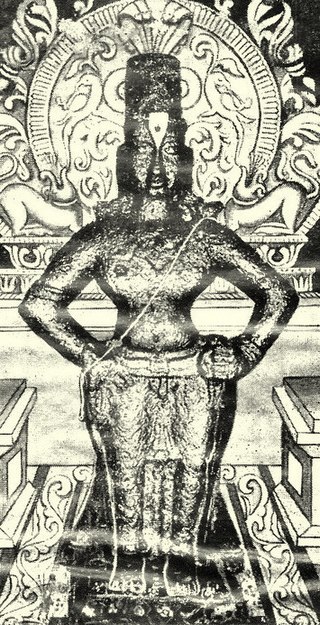
Vithoba, also known as Vitthala, and Panduranga, is a Hindu god predominantly worshipped in the Indian state of Maharashtra and Karnataka. He is a form of the god Vishnu. Vithoba is often depicted as a dark young boy, standing arms akimbo on a brick, sometimes accompanied by his consort Rakhumai.
Sant Janābāi was a Marāthi religious poet in the Hindu tradition in India, who was born likely in the seventh or the eighth decade of the 13th century. She died in 1350.
Marathi poetry is a poetry written in the Marathi language, including its various dialects.

Durga Narayan Bhagwat, popularly known as Durga Bhagwat, was an Indian scholar, socialist and writer. She studied Sanskrit and Buddhist literature and spent time in the jungles of Madhya Pradesh to study tribal life. She later returned to Mumbai as a researcher and wrote books in Marathi. She is arguably the foremost female writer in Marathi. Shes one amongst the prominent writers who opposed The Emergency (India). She also abstained from accepting such institutional and civilian honours as the Padma Shree and the Jnanapeeth.
Ram Balkrushna Shewalkar was a Marathi orator, writer, and literary critic from Maharashtra, India.
Ram Ganesh Gadkari was a Marathi poet, playwright, and humorist from Bombay Presidency, India.
Visoba Khechara, spelled also as Visoba Khechar or Visoba Khecar, was the yogi-guru of the Varkari poet-saint Namdev (c.1270-1350) of Maharashtra, India. Visoba was a disciple of the Varkari poet-saint Jñāneśvar. He had linkages with the Varkari tradition as well as the Nath tradition of Maharashtra. Though a staunch Shaiva, Visoba has composed verses in praise of the god Vithoba, the patron deity of the Varkari faith. He has also composed a metaphysical treatise called the Shatsthala.
Nivruttinath was a 13th-century Marathi Bhakti saint, poet, philosopher and yogi of the Vaishnava Nath tradition. He was the elder brother and the mentor (guru) of Dnyaneshwar, the first Varkari saint.
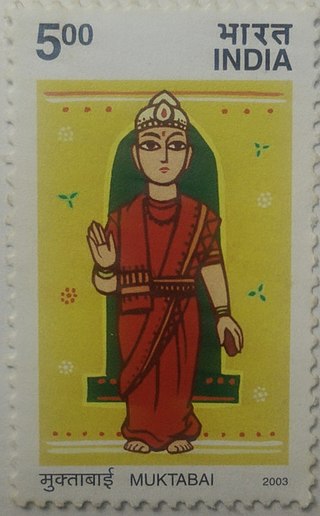
Muktabai or Mukta was a saint in the Varkari Movement. She was born in a Deshastha Brahmin family and was the younger sister of Dnyaneshwar, the first Varkari saint. She wrote forty-one abhangs throughout her life.
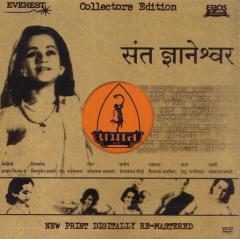
Sant Dnyaneshwar is a 1940 film about the life of Jñāneśvar (1275–1296), a 13th-century Marathi poet, philosopher, sant and yogi of the Nath tradition.
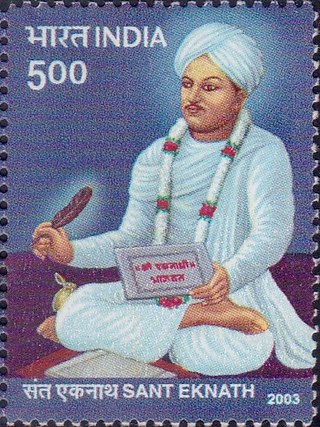
Eknath (1533–1599), was an Indian Hindu saint, philosopher and poet. He was a devotee of the Hindu deity Vitthal and is a major figure of the Warkari movement. Eknath is often viewed as a spiritual successor to the prominent Marathi saints Dnyaneshwar and Namdev.
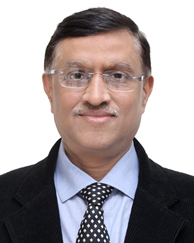
Dnyaneshwar Mulay – ज्ञानेश्वर मुळे, an Indian Career Diplomat who superannuated after 35 years of service, was appointed by the President of India as the Member, National Human Rights Commission in April 2019. He joined the Indian Foreign Service in 1983 and has since served in several capacities, including the Consul General of India, New York, and the High Commissioner of India, Male, Maldives. He is a successful writer and has written over 15 books, which have been translated in Arabic, Dhivehi, Urdu, Kannada and Hindi. His magnum-opus – Maati, Pankh ani Akash, written in Marathi, has received immense popularity and has also been prescribed in the Arts curriculum at the North Maharasthra University, Jalgaon (Maharashtra). He has inspired a number of socio-educational projects including Balodyan, an orphanage in his native village, and the Dnyaneshwar Mulay Education Society, which seeks to introduce innovative concepts like Global Education.